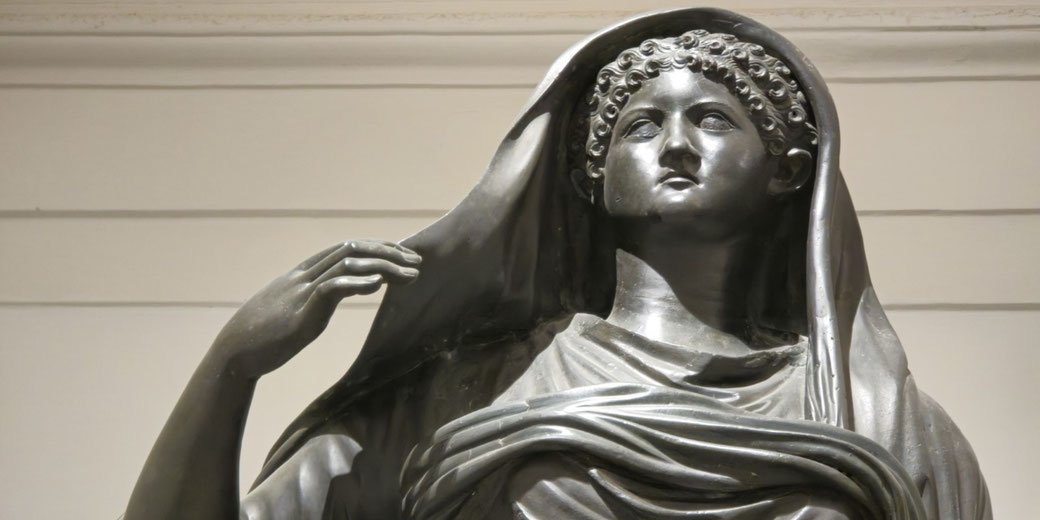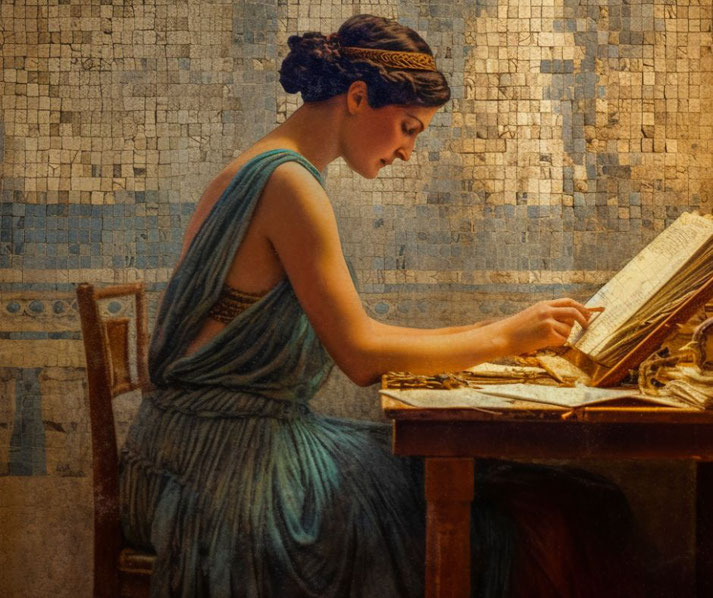Agrippina: The woman who made Nero emperor, but was murdered by her own son

Agrippina the Younger, born into the illustrious Julio-Claudian dynasty, navigated the treacherous waters of Roman politics with a finesse and ambition seldom seen in her era.
Her life, punctuated by strategic marriages, political maneuverings, and a relentless pursuit of power, ended tragically: murdered at the hands of Nero, her own son.
Growing up as a woman in early imperial Rome
Born on November 6, 15 AD, Agrippina the Younger was the daughter of Germanicus, a celebrated Roman general, and Agrippina the Elder, a formidable woman in her own right.
Her lineage was deeply rooted in Roman nobility, as she was the great-granddaughter of Emperor Augustus, the founder of the Roman Principate.
Her early years were marked by the prominence of her family, as her father's military successes made the Germanicus branch of the Julio-Claudian dynasty particularly esteemed in Rome.
However, her childhood was not without its share of tragedies. In 19 AD, when Agrippina was just four years old, her father Germanicus died under mysterious circumstances, leading to rumors of poisoning and political foul play.
This event thrust her family into a series of confrontations with the ruling emperor, Tiberius.
The tensions culminated in the exile and eventual death of her mother, Agrippina the Elder, and two of her brothers.
These events not only exposed young Agrippina to the volatile nature of Roman politics but also instilled in her a deep-seated resilience and a keen understanding of power dynamics.

Becoming a pawn in political marriages
Agrippina the Younger's personal relationships and marriages played a pivotal role in her ascent to power, each alliance bringing her closer to the epicenter of Roman politics.
Her first marriage, at a relatively young age, was to Lucius Ahenobarbus, a member of the Roman elite.
This union bore her a son, Lucius Domitius Ahenobarbus, who would later be known as the infamous Emperor Nero.
The early death of Ahenobarbus left Agrippina a widow, but her status and lineage ensured she was not without suitors for long.
Her second marriage was to Gaius Sallustius Crispus Passienus, a wealthy and influential Roman statesman.
While this marriage further solidified her position within the Roman aristocracy, it was her third marriage that would catapult her to unprecedented heights of power.
Agrippina's dramatic exile from Rome
In 39 AD, following a conspiracy in which her sister Livilla and her cousin Lepidus were implicated, Agrippina was accused of being part of the plot against the unpredictable emperor.
As a result, she was exiled to the small island of Pandateria, a place that had previously served as the place of exile for her own mother, Agrippina the Elder.
Life in exile was a stark contrast to the luxuries and influence she had once enjoyed in Rome.
Isolated and removed from the political machinations of the capital, Agrippina had to rely on her resilience and determination to endure this challenging period.
However, her time in exile would not last indefinitely.

With the assassination of Caligula in 41 AD, the political landscape shifted dramatically.
His successor, Emperor Claudius, who was also Agrippina's uncle, took the throne.
Recognizing the potential benefits of aligning with the Julio-Claudian bloodline and perhaps influenced by familial ties, Claudius recalled Agrippina from exile in the same year he ascended to the throne.
Her return to Rome marked a turning point in her life. No longer a sidelined member of the imperial family, Agrippina quickly reestablished herself in the Roman elite's circles.
How Agrippina became a political power player
In 49 AD, she wed her uncle, Emperor Claudius. This union was controversial, requiring a change in Roman law to allow an uncle to marry his niece.
As the empress, Agrippina wielded significant influence, using her position to eliminate rivals.Her marriage to Emperor Claudius was a masterstroke, positioning her at the very heart of imperial decision-making.
As empress, she quickly established herself as a formidable force within the palace, ensuring that those loyal to her were placed in key positions of power.
This network of allies and supporters bolstered her influence, allowing her to shape policies and decisions that furthered her interests and those of her son, Nero.
One of her most significant political maneuvers was ensuring Nero's adoption by Claudius, effectively sidelining Claudius's biological son, Britannicus.
This move not only secured Nero's position as the heir apparent but also guaranteed Agrippina's continued influence after Claudius's death.
Her hand in governance was evident in various administrative reforms and decisions during this period, reflecting her keen understanding of statecraft and governance.
However, Agrippina's influence was not limited to the palace's confines. She was known to have established connections with the Roman military, ensuring loyalty from key figures within the legions.
Additionally, she cultivated relationships with foreign dignitaries and rulers, enhancing her stature on the international stage.
Yet, with power came adversaries. As Agrippina's influence grew, so did the number of those who viewed her as a threat.
Her overt involvement in state affairs, especially as a woman in a male-dominated political landscape, drew criticism and suspicion.

Nero's rise to the throne and conflict with Agrippina
When Nero ascended to the throne in 54 AD, Agrippina expected to maintain a significant influence over the young emperor, guiding his decisions and shaping the empire's policies.
However, as Nero matured and began to assert his own authority, tensions between the two escalated.
The young emperor sought to distance himself from his mother's control, increasingly sidelining her from political decisions and surrounding himself with advisors who were often at odds with Agrippina.
Seneca, Nero's tutor, and Burrus, the Praetorian prefect, played crucial roles in this period, often acting as counterweights to Agrippina's influence.
The rift between mother and son became more pronounced over time. By 55 AD, just a year into Nero's reign, Agrippina had been removed from the imperial palace.
This physical separation was symbolic of the growing chasm in their relationship.
Matters reached a head in 59 AD when, driven by paranoia and the desire to rid himself of his mother's perceived threat, Nero decided to eliminate Agrippina.
The accounts of her assassination are varied and dramatic, with tales of failed plots and elaborate schemes.
One of the most notorious stories suggests that Nero initially attempted to drown Agrippina by designing a collapsible boat.
When this plan failed and Agrippina survived, a more direct approach was taken.
She was ultimately killed at her villa in Misenum, with ancient sources suggesting she faced her assassins with a defiant courage.
Agrippina's death marked the end of her tumultuous journey through the treacherous landscape of Roman politics.
Her ambition, intelligence, and resilience had taken her to the empire's highest echelons, but her downfall was precipitated by the very person she had worked so hard to elevate: her own son.

Was Agrippina a heroine or a villain?
Ancient historians, including Tacitus, Suetonius, and Cassius Dio, often portrayed her as a manipulative and power-hungry woman, emphasizing her ambition and alleged ruthlessness.
These accounts, written in a patriarchal society, frequently framed her actions within the context of perceived female vices, such as seduction and deceit.
Such portrayals have, for centuries, influenced perceptions of Agrippina, casting her as a scheming mother and a dangerous political player.
However, modern historians and scholars have begun to reassess Agrippina's role and influence, offering a more nuanced understanding of her life and legacy.
While her ambition is undeniable, it is now often viewed within the broader context of the Julio-Claudian dynasty's politics, where power plays and political maneuverings were the norm, irrespective of gender.
In this light, Agrippina emerges as a savvy political operator, adept at navigating the complexities of Roman imperial politics.
Furthermore, her efforts to secure Nero's position as emperor and her subsequent role in his early reign highlight her capabilities as a strategist and leader.
Her influence on administrative reforms and her engagement with foreign dignitaries underscore her contributions to the Roman state.
In the broader scope of Roman history, Agrippina serves as a reminder of the often overlooked but pivotal roles women played in shaping the empire's trajectory.
While ancient narratives may have been tinged with bias and prejudice, her legacy today is increasingly recognized for its complexity and significance.
What do you need help with?
Download ready-to-use digital learning resources
Copyright © History Skills 2014-2025.
Contact via email
With the exception of links to external sites, some historical sources and extracts from specific publications, all content on this website is copyrighted by History Skills. This content may not be copied, republished or redistributed without written permission from the website creator. Please use the Contact page to obtain relevant permission.





